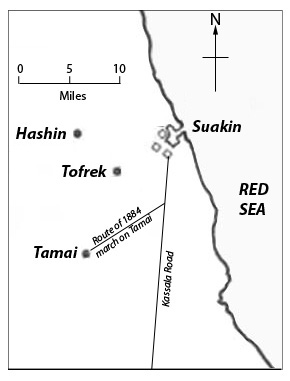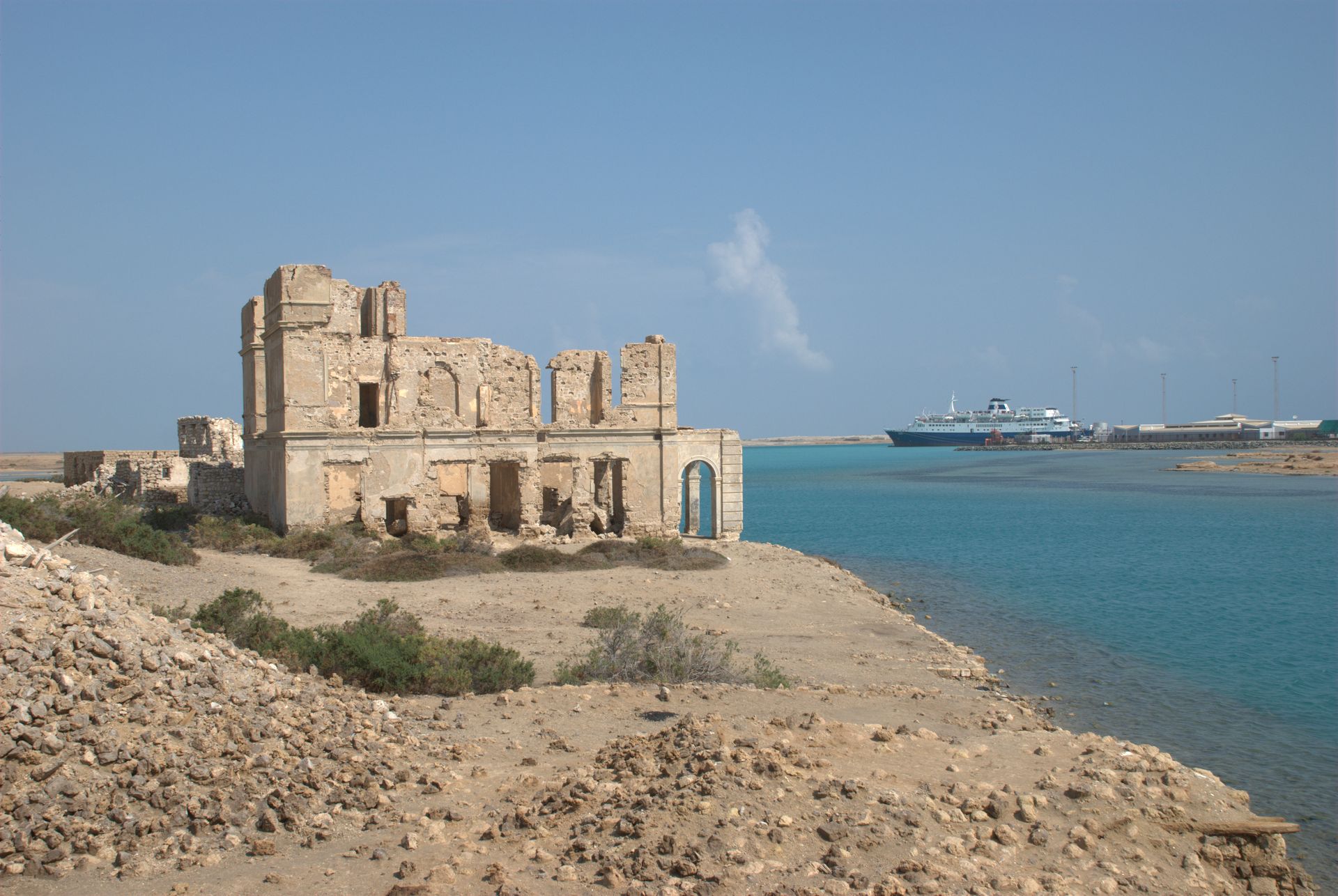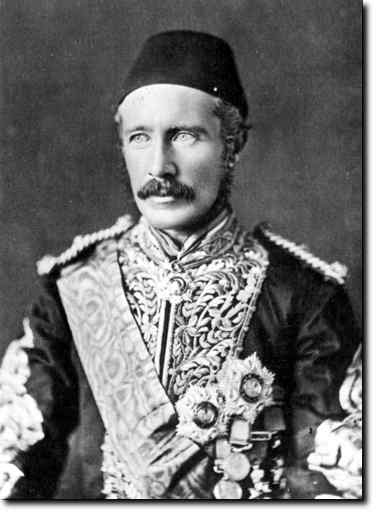|
Suakin Expedition
The Suakin Expedition was either of two British military expeditions, led by Major-General Sir Gerald Graham V.C., to Suakin in Sudan, with the intention of destroying the power of the Sudanese military commander Osman Digna and his troops during the Mahdist War. The first expedition took place in February 1884 and the second in March 1885. First expedition The first expedition, in February 1884, led to several notable British victories, among them the Second Battle of El Teb and the Battle of Tamai. Second expedition Following the fall of Khartoum on 26 January 1885, Graham led a second expedition in March 1885. This expedition is sometimes referred to as the Suakin Field Force. Its purpose was to defeat Mahdist forces under Osman Digna in the region and to supervise and protect the construction of the Suakin-Berber Railway. A week after its arrival in Suakin, the expedition fought in two actions: the Battle of Hashin or Hasheen on 20 March, and the Battle of Tofrek on 22 Mar ... [...More Info...] [...Related Items...] OR: [Wikipedia] [Google] [Baidu] |
Gerald Graham
Lieutenant General Sir Gerald Graham, (27 June 1831 – 17 December 1899) was a senior British Army commander in the late 19th century and an English recipient of the Victoria Cross, the highest award for gallantry in the face of the enemy that can be awarded to British and Commonwealth forces. Early life He was born in Acton, Middlesex, and after studying at Wimbledon and Dresden he was admitted (1847) to the Royal Military Academy at Woolwich and completed his military training in the School of Military Engineering at Chatham. Victoria Cross He was 23 years old, and a lieutenant in the Corps of Royal Engineers, British Army during the Crimean War when the following deed took place for which he was awarded the VC. On 18 June 1855 in the Crimea, Lieutenant Graham, accompanied by a sapper (John Perie) showed determined gallantry at the head of a ladder party at the assault on the Redan at Sebastopol. He also went out on numerous occasions to bring in wounded officers and me ... [...More Info...] [...Related Items...] OR: [Wikipedia] [Google] [Baidu] |
Suakin-Berber Railway
The Suakin-Berber railway on the Red Sea coastal region in Sudan was a short-lived military project that never reached completion. Its construction began in February 1885, being intended to provide a connection between Berber on the River Nile and Suakin on the Red Sea littoral for the rapid deployment of troops and military equipment in Britain’s involvement in the Mahdist war. In May 1885, after barely three of months of work during which only 20 of the intended 280 miles of track had been laid, at a cost approaching £1 million, Britain suspended its war with the Mahdi, pulled out of the Sudan and terminated the Suakin-Berber railway. The escalating difficulties and costs of building the railway served to provide ammunition to Gladstone's opponents in Parliament and in so doing helped in bringing down his second administration. Background In 1883 Britain became involved in hostilities against the Mahdi revolt, sending General Gordon to Khartoum to organize the evacu ... [...More Info...] [...Related Items...] OR: [Wikipedia] [Google] [Baidu] |
Conflicts In 1884
Conflict may refer to: Arts, entertainment, and media Films * ''Conflict'' (1921 film), an American silent film directed by Stuart Paton * ''Conflict'' (1936 film), an American boxing film starring John Wayne * ''Conflict'' (1937 film), a Swedish drama film directed by Per-Axel Branner * ''Conflict'' (1938 film), a French drama film directed by Léonide Moguy * ''Conflict'' (1945 film), an American suspense film starring Humphrey Bogart * ''Catholics: A Fable'' (1973 film), or ''The Conflict'', a film starring Martin Sheen * ''Judith'' (1966 film) or ''Conflict'', a film starring Sophia Loren * ''Samar'' (1999 film) or ''Conflict'', a 1999 Indian film by Shyam Benegal Games * ''Conflict'' (series), a 2002–2008 series of war games for the PS2, Xbox, and PC * ''Conflict'' (video game), a 1989 Nintendo Entertainment System war game * '' Conflict: Middle East Political Simulator'', a 1990 strategy computer game Literature and periodicals * ''Conflict'' (novel) ... [...More Info...] [...Related Items...] OR: [Wikipedia] [Google] [Baidu] |
Herbert Kitchener, 1st Earl Kitchener
Horatio Herbert Kitchener, 1st Earl Kitchener, (; 24 June 1850 – 5 June 1916) was a senior British Army officer and colonial administrator. Kitchener came to prominence for his imperial campaigns, his scorched earth policy against the Boers, his expansion of Lord Roberts' concentration camps during the Second Boer War and his central role in the early part of the First World War. Kitchener was credited in 1898 for having won the Battle of Omdurman and securing control of the Sudan for which he was made Baron Kitchener of Khartoum. As Chief of Staff (1900–1902) in the Second Boer War he played a key role in Roberts' conquest of the Boer Republics, then succeeded Roberts as commander-in-chief – by which time Boer forces had taken to guerrilla fighting and British forces imprisoned Boer civilians in concentration camps. His term as Commander-in-Chief (1902–1909) of the Army in India saw him quarrel with another eminent proconsul, the Viceroy Lord Curzon, who ev ... [...More Info...] [...Related Items...] OR: [Wikipedia] [Google] [Baidu] |
Brevet (military)
In many of the world's military establishments, a brevet ( or ) was a warrant giving a commissioned officer a higher rank title as a reward for gallantry or meritorious conduct but may not confer the authority, precedence, or pay of real rank. An officer so promoted was referred to as being brevetted (for example, "he was brevetted major general"). The promotion would be noted in the officer's title (for example, "Bvt. Maj. Gen. Joshua L. Chamberlain" or "Bvt. Col. Arthur MacArthur"). It is not to be confused with a '' Brevet d'état-major'' in Francophone European military circles, where it is an award, nor should it be confused with temporary commissions. France In France, ''brevet'' is a word with a very broad meaning, which includes every document giving a capacity to a person. For instance, the various military speciality courses, such as military parachutism, are ended by the award of a brevet. The more important brevet in the French military is the one of the Éc ... [...More Info...] [...Related Items...] OR: [Wikipedia] [Google] [Baidu] |
William Ewart Gladstone
William Ewart Gladstone ( ; 29 December 1809 – 19 May 1898) was a British statesman and Liberal politician. In a career lasting over 60 years, he served for 12 years as Prime Minister of the United Kingdom, spread over four non-consecutive terms (the most of any British prime minister) beginning in 1868 and ending in 1894. He also served as Chancellor of the Exchequer four times, serving over 12 years. Gladstone was born in Liverpool to Scottish parents. He first entered the House of Commons in 1832, beginning his political career as a High Tory, a grouping which became the Conservative Party under Robert Peel in 1834. Gladstone served as a minister in both of Peel's governments, and in 1846 joined the breakaway Peelite faction, which eventually merged into the new Liberal Party in 1859. He was chancellor under Lord Aberdeen (1852–1855), Lord Palmerston (1859–1865) and Lord Russell (1865–1866). Gladstone's own political doctrine—which emphasised equalit ... [...More Info...] [...Related Items...] OR: [Wikipedia] [Google] [Baidu] |
New South Wales Contingent
The New South Wales Contingent served in Sudan with British forces as part of the Suakin Expedition in 1885. Consisting of an infantry battalion, an artillery battery, and a small field ambulance detachment, it departed from Sydney on 3 March 1885. Arriving at Suakin on 29 March it ultimately saw little action, being involved in a minor action at Tamai on 3 April, and another at Takdul on 6 May. However, with the British deciding to abandon the campaign it re-embarked on 17 May and returned to Sydney on 19 June 1885, where it was disbanded. The New South Wales Contingent was the first military contingent to be raised and deployed overseas by an Australian colony. History During the early years of the 1880s, an Egyptian regime in the Sudan, backed by the British, came under threat from rebellion under the leadership of native Muhammad Ahmad (or Ahmed), known as Mahdi to his followers. In 1883, as part of the Mahdist War, the Egyptians sent an army to deal with the revolt, but ... [...More Info...] [...Related Items...] OR: [Wikipedia] [Google] [Baidu] |
Battle Of Tofrek
The Battle of Tofrek was fought on 22 March 1885 some 5 miles inland from the port of Suakin on the Red Sea coast of Sudan. A contingent of some 3000 troops from the British and Indian "Suakin Field Force" led by Major General Sir John Carstairs McNeill VC, GCVO, KCB, KCMG (under the overall command of General Gerald Graham) was attacked by a Mahdist force under the leadership of Osman Digna. The Mahdists were heavily defeated, losing some 1000 of their 2000 fighters as compared to the loss of 70 British and Indian soldiers plus over 100 casualties. Background The sacking of Khartoum and the killing of General Gordon and the massacre of thousands of civilians at the hands of Mahdist warriors in January 1885, together with the failure of the relief effort of General Wolseley's Nile Expedition, prompted the British government to revive plans to build a railway between the port of Suakin on the Red Sea and Berber on the River Nile some 300 miles north of Khartoum, to prov ... [...More Info...] [...Related Items...] OR: [Wikipedia] [Google] [Baidu] |
Muhammad Ahmad
Muhammad Ahmad ( ar, محمد أحمد ابن عبد الله; 12 August 1844 – 22 June 1885) was a Nubian Sufi religious leader of the Samaniyya order in Sudan who, as a youth, studied Sunni Islam. In 1881, he claimed to be the Mahdi, and led a successful war against Ottoman-Egyptian military rule in Sudan and achieved a remarkable victory over the British, in the siege of Khartoum. He created a vast Islamic state extending from the Red Sea to Central Africa, and founded a movement that remained influential in Sudan a century later. From his announcement of the Mahdist State in June 1881 until its end in 1898, Holt, P.M.: "The Mahdist State in Sudan, 1881-1898". Oxford: Clarendon Press, 1970. p. 45. the Mahdi's growing number of supporters, the Ansars, established many of its theological and political doctrines. After Muhammad Ahmad's unexpected death on 22 June 1885, his chief deputy, Abdallahi ibn Muhammad took over the administration of the nascent Mahdist Stat ... [...More Info...] [...Related Items...] OR: [Wikipedia] [Google] [Baidu] |
Suakin
Suakin or Sawakin ( ar, سواكن, Sawákin, Beja: ''Oosook'') is a port city in northeastern Sudan, on the west coast of the Red Sea. It was formerly the region's chief port, but is now secondary to Port Sudan, about north. Suakin used to be considered the height of medieval luxury on the Red Sea, but the old city built of coral is now in ruins. In 1983, the adjacent historic mainland town, known as the Geyf, had a population of 18,030 and the 2009 estimate is 43,337. Ferries run daily from Suakin to Jeddah in Saudi Arabia. Etymology The Beja name for Suakin is Oosook. This is possibly from the Arabic word ''suq'', meaning market. In Beja, the locative case for this is ''isukib'', whence Suakin might have derived.Berg, RobertSuakin: Time and Tide. ''Saudi Aramco World.'' The spelling on Admiralty charts in the late 19th century was "Sauakin", but in the popular press "Suakim" was predominant. History Ancient Suakin was likely Ptolemy's Port of Good Hope, Limen Evangelis, ... [...More Info...] [...Related Items...] OR: [Wikipedia] [Google] [Baidu] |
Siege Of Khartoum
The Siege of Khartoum (also known as the Battle of Khartoum or Fall of Khartoum) occurred from 13 March 1884 to 26 January 1885. Sudanese Mahdist forces captured the city of Khartoum from its Egyptian garrison, thereby gaining control over the whole of Sudan. Egypt had controlled Sudan since 1820, but had itself come under British domination in 1882. In 1881, the Mahdist Revolt began in Sudan, led by Muhammad Ahmad who claimed to be the Mahdi. The Egyptian army was unable to suppress the revolt, being defeated in several battles and retreating to their garrisons. The British refused to send a military force to the area, instead appointing Charles George Gordon as Governor-General of Sudan, with orders to evacuate Khartoum and the other garrisons. Gordon arrived in Khartoum in February 1884, where he found it impossible to reach the other garrisons which were already besieged. Rather than evacuating immediately, Gordon began to fortify the city, which was cut off when the lo ... [...More Info...] [...Related Items...] OR: [Wikipedia] [Google] [Baidu] |
Battle Of Tamai
The Battle of Tamai (or Tamanieh) took place on 13 March 1884 between a British force under Sir Gerald Graham and a Mahdist Sudanese army led by Osman Digna. Despite his earlier victory at El Teb, Graham realised that Osman Digna's force was far from broken and that he still enjoyed support among the local population. Accordingly, a second expedition departed from Suakin on 10 March in order to defeat the Mahdists definitively. The force was composed of the same units that had fought at El Teb: 4,500 men, with 22 guns and 6 machine guns. The Mahdists had roughly 10,000 men, most of them belonging to Osman Digna's Hadendoa tribe (known to British soldiers as " Fuzzy Wuzzies" for their unique hair). Forces The British forces involved in the battle were: * Squadron from 10th Hussars * Squadron from 19th Hussars * 1st Battalion, The Black Watch (Royal Highlanders) * 3rd Battalion, The King's Royal Rifle Corps * 1st Battalion, York and Lancaster Regiment * 1st Battalion, G ... [...More Info...] [...Related Items...] OR: [Wikipedia] [Google] [Baidu] |








